Search for tips on how to be a better writer and you’ll find this piece of advice anywhere: read. It’s no secret that reading is good for you, but no one benefits more from reading books than people who want to write their own. Reading can teach you a lot about the craft of writing, so if you really want to improve your skills, start by expanding your library. Books are among your greatest tools for writing success!
So to elaborate on the second point of my list of good writing habits, here are five ways that reading makes you a better writer. Enjoy, and best of luck in your writing career!
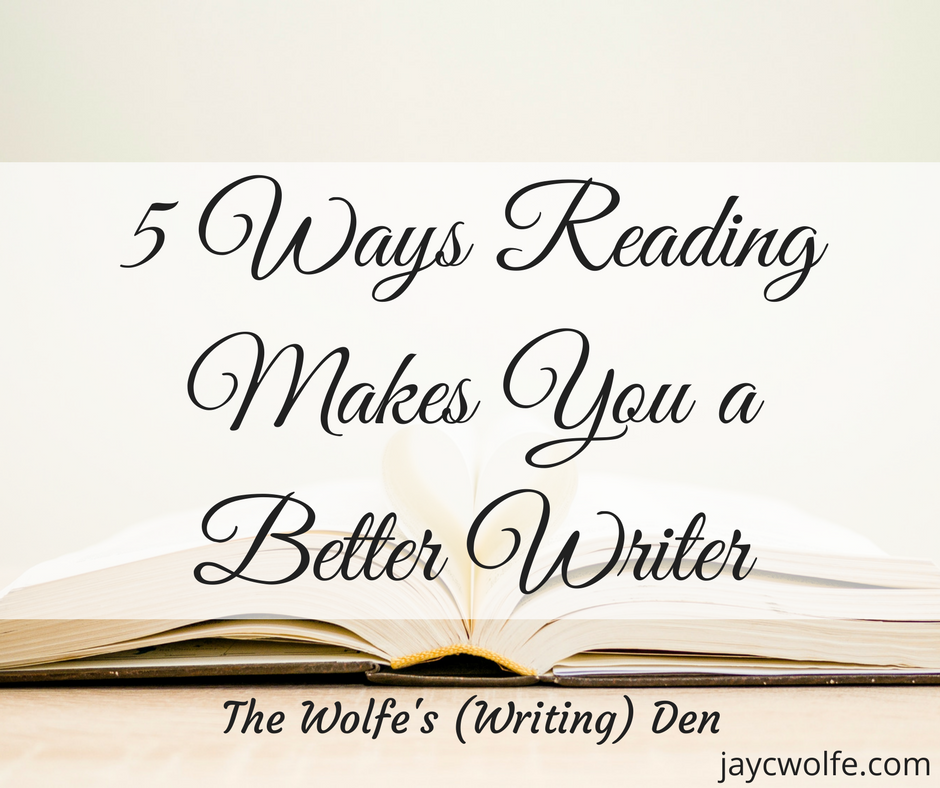
1) Reading teaches you the basics of story structure.
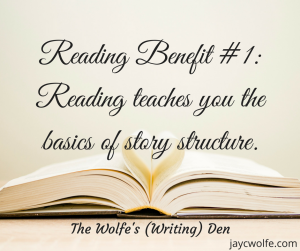 Let’s start with the obvious, shall we? If you want to learn how to write a story, the best way to start is by reading one. It’s as simple as that—so simple, in fact, that we already learned this lesson as children!
Let’s start with the obvious, shall we? If you want to learn how to write a story, the best way to start is by reading one. It’s as simple as that—so simple, in fact, that we already learned this lesson as children!
Think about the last time you read a fairy tale or watched a Disney movie. Notice that these stories always have a very basic plot structure: Hero enters, Villain causes Conflict, Hero fights Villain, Hero defeats Villain, everyone lives Happily Ever After. Doesn’t get any simpler than that, does it?
Dramatic structure refers to these steps as exposition, rising action, climax, falling action, and resolution. Of course, not all stories will follow exactly the same outline—you don’t always need a villain to create conflict, for example—but regardless of content, they will invariably have structure. Reading many books in various genres will reveal what all stories have in common, and that’s the first step toward becoming a master of fiction!
2) You learn what works in a story (and what doesn’t).
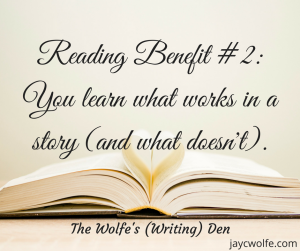 After learning the basics of story structure, the next step is to learn how to write a good story. This is easier said than done, which is why it’s important to read as many good books as possible. Only by understanding what works in other writers’ stories can you figure out how to improve yours.
After learning the basics of story structure, the next step is to learn how to write a good story. This is easier said than done, which is why it’s important to read as many good books as possible. Only by understanding what works in other writers’ stories can you figure out how to improve yours.
Now I know what you’re thinking: If art is subjective and everyone has different tastes, how can you know which books are “good”? The only way to be sure is by reading as many as you can and deciding for yourself what makes a story worth reading. An excellent piece of advice for beginning writers is to start by writing what you like, and you can’t know what you like unless you read!
Of course, bad books can be just as eye-opening as good ones. Who among us hasn’t tried to slog their way through a terribly written novel with flat characters and boring plot points? I know it sounds like torture, but the good news is that reading a bad book isn’t a complete waste of time: by recognizing the flaws that turn you off to someone else’s story, you’ll know what to avoid in yours. In short: Be the next J.K. Rowling, not the next Stephenie Meyer!
3) You get a better sense of how to write in your genre.
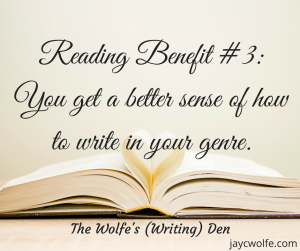 While reading is good in general, reading certain types of stories can be especially beneficial for writers. Every genre has its distinct traits, so reading in your genre of choice can teach you specific writing techniques that you couldn’t pick up from other books.
While reading is good in general, reading certain types of stories can be especially beneficial for writers. Every genre has its distinct traits, so reading in your genre of choice can teach you specific writing techniques that you couldn’t pick up from other books.
If you want to write fantasy, read series like Harry Potter or The Lord of the Rings to learn how to incorporate magic into your world in a logical and believable way. If you choose dystopian fiction, books like 1984, The Handmaid’s Tale, or The Hunger Games will help you understand how to write a future society based on a single drastically different detail. Read Stephen King‘s stories to learn how to write thrilling suspense and horror, or read Jane Austen for a sense of how to write good romantic and historical fiction.
Whatever genre you choose to write in, read those types of books until you feel confident you can write a good story that fits the style… and then keep on reading! So long as you continue indulging in books, you’ll find that you’ll never stop learning for the rest of your writing career. Your stories can only keep getting better!
4) Books expand your imagination.
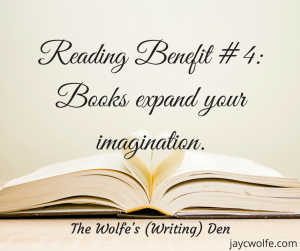 When I started reading as a little kid, it opened my entire world to hundreds of new possibilities. My love of books inspired me to start writing when I was nine years old, and I’ve never looked back. I couldn’t tell you how many of my favorite story ideas have come from reading; to this day, no matter what kind of stories I write, I can always find some ideas from books I love and influence from my favorite authors in them!
When I started reading as a little kid, it opened my entire world to hundreds of new possibilities. My love of books inspired me to start writing when I was nine years old, and I’ve never looked back. I couldn’t tell you how many of my favorite story ideas have come from reading; to this day, no matter what kind of stories I write, I can always find some ideas from books I love and influence from my favorite authors in them!
Reading books is a great way to battle writer’s block because books are a rich source of ideas. You don’t have to outright copy other writers’ ideas, of course—in fact, you shouldn’t—but emulating the concepts and styles of writers you admire will help you develop more original ideas of your own in the long run.
So whenever you’re starved for ideas, pick up a novel and see what jumps off the page. You’d be surprised how many creative new ideas are hiding in plain sight on your shelf!
5) Reading replenishes your writing energy.
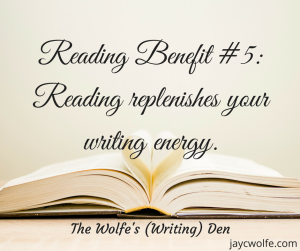 Despite all the previous points on this list, you don’t really need any other reason to read than the fact that it’s fun! Let’s face it, we all need regular breaks from our work, even when that work is our life’s passion (like writing). If you’re just not feeling the words flow, there’s no shame in stepping away from your story for a while to read someone else’s!
Despite all the previous points on this list, you don’t really need any other reason to read than the fact that it’s fun! Let’s face it, we all need regular breaks from our work, even when that work is our life’s passion (like writing). If you’re just not feeling the words flow, there’s no shame in stepping away from your story for a while to read someone else’s!
Reading has been proven to relieve stress and reduce anxiety, which is extra helpful for writers. What writer hasn’t felt stressed after hours of struggling with creative blocks or self-doubt, right? (I know I have.) Even if you are feeling relaxed and productive, fiction is a great escape from mundane routine. We’ve all had to recharge after long stretches of writing, and if you’re going to pause anyway, why not use that time to indulge in a hobby that will help you get better at it?
So the next time you feel drained of the energy to write, try picking up a book. You may find it’s just the thing you need to get you back on your writing streak!
What are your thoughts on these benefits of reading? How has reading made you a better writer?
Photo by Michał Grosicki on Unsplash


Great post, J.C. – and I couldn’t agree more with all your points. Reading has been one of the greatest pleasures of my life. Rarely does a day go by when I don’t have my nose in a book (or Kindle, nowadays) at some point. Reading certainly replenishes my writing energy! 😀
Thanks, Millie! I read every day too, and I agree: it’s one of the greatest joys in life! Glad you enjoyed the post! Thanks for reading! 🙂